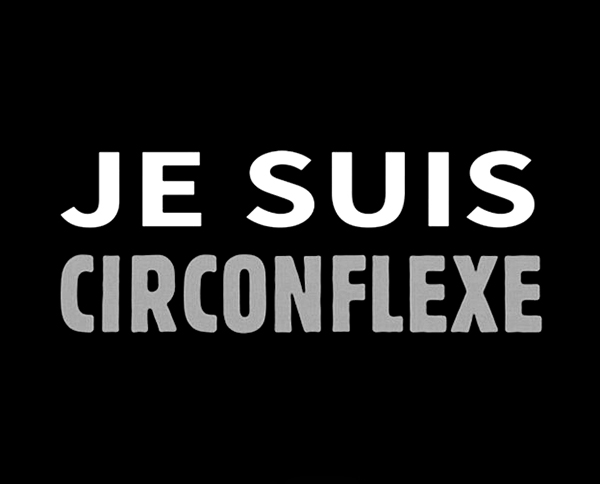 The circumflex accent
The circumflex accent An acute crisis on a not-so-grave topic
Turmoil took over the simplification for the use of the circumflex accent in the French language. But this step had already been officialised by the French Academy some 20 years ago. Unanimously.
"Je suis circonflexe"
In early February, a quaint gossip spread in the French social networks: the circumflex accent was facing banishment from the French language. A decision supposedly imposed by the Ministry of Education in order to facilitate the learning of French in schools and to be implemented as early as the next school year.
The news quickly spread over the Web and triggered a strong national controversy. "Do we delete the dates of the history of France because they're hard to remember?", said a teacher in classics on a national TV channel, "(...) or is it easier to break the thermometer rather than cure the difficulties in spelling that students and pupils experience today?"
"Race to the bottom", "cultural decay", etc. Outcries multiplied. A hashtag #JeSuisCirconflexe even appeared on Twitter: as if a year after the Charlie Hebdo attacks, it was the turn of French language to be attacked by terrorists!
A delayed controversy
After having briskly spread, the fire of the controversy quickly died out. And for a good reason: there was never any intention to abandon the circumflex accent.
In November 2015, the Ministry of Education just invited the teachers to consider the spelling changes suggested in 1990 by the Conseil supérieur de la langue française (Higher Institution for French Language). And these rectifications (unanimously approved by the French Academy over twenty years ago) don't advocate for a blind elimination of the circumflex accent, but rather suggest their non-use in specific and non-ambiguous words.
It is thus possible to write "ile" (island) instead of "île", "naitre" (to be born) instead of "naître" or "paraitre" (to seem) instead of "paraître". But this is a simple recommendation: as early as 1990, the French Academy reminded that "people who already master traditional spelling can obviously disregard the new standard". However, using the circumflex accent is still mandatory for words such as "dû" (owed), "jeûne" (fasting) or "sûr" (sure), which have misleading homonyms: "du" means "of", "jeune" is "young" and "sur" means "on, over".
Oddly enough, the Ministry of Education had already suggested to teachers to use the rectified spelling as a reference in 2008, but without stirring such turmoil at the time. Lovers of the French language, rest assured: your beloved "Chinese hat" still has bright days ahead.